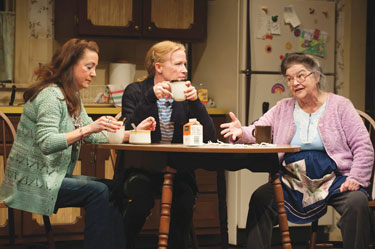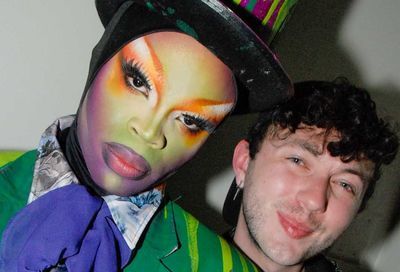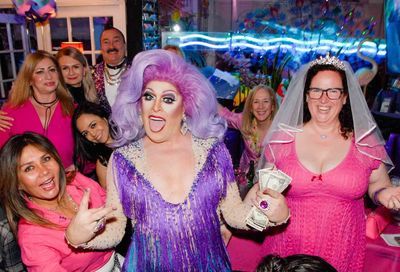The One Who Got Away
''Good People'' is a highly entertaining, very funny and all-around insightful drama, painted with exquisite cultural detail
If there is a way to think of Margaret, the indefatigable protagonist of David Lindsay-Abaire’s Good People, it might be with the words of columnist Doug Larson who said, ”A weed is a plant that has mastered every survival skill except for learning how to grow in rows.”
For although Margaret – born, bred and permanently embedded in her working-class South Boston neighborhood – has learned to navigate the meager opportunities and bad luck of poverty, she has also evolved an oblique kind of thinking. It has a stubbornness to it; an aspect of rationalizing, despite a smart, sometimes cunning mind. And although this rationalizing may often parallel reality, it has also allowed for the quiet solidification of a very private, virtually subconscious personal myth. It is a sense of self that even as it fortifies the daily struggle, might nevertheless serve as a subtle form of self-sabotage. If she has all the answers then there is nothing to regret, but also nothing to change. It is the coping mechanism that has allowed a keen (if uneducated) intellect to survive itself. And if she will be cruel to protect it, does that make her a bad person? And what of those tantalizing moments when Margaret asserts what is both the truth and what she needs to believe? Who gets to decide such moral high ground?

Good People
(Photo by Margot Schulman)
Beautifully identified and crafted, Margaret exists at the heart of what also happens to be a highly entertaining, very funny and all-around insightful drama, painted with exquisite cultural detail. A South Boston native himself, Lindsay-Abaire delivers an expression of his world with an authenticity that resonates whether you know this ”other” Boston (or its suburban refuges) or not. But it’s not about dropping the R’s or noting the references. It’s about the cadence and rhythms of a claustrophobically tight-knit community that has, with brute certainty, decided to be nobody’s fool. Lindsay-Abaire has caught it all. The only question is whether any given production can deliver it. This one does.
Embracing the vision as if she’s lived it, director Jackie Maxwell keeps a tempo and time as witty as the play itself and lets the naturals fly. Equally simpatico, designer Todd Rosenthal’s cramped and gloomy houses, nighttime windows lit with analog television blue, and interiors limping along with ’70s-era Colonial kitsch, are potently suggestive of the quiet poverty in this back end of Boston. An evocation of settled neglect, he gives us houses carrying apartments filled with families, the unemployed and the elderly. No one can afford to make the windows shinier or the siding better.
Support Metro Weekly’s Journalism
These are challenging times for news organizations. And yet it’s crucial we stay active and provide vital resources and information to both our local readers and the world. So won’t you please take a moment and consider supporting Metro Weekly with a membership? For as little as $5 a month, you can help ensure Metro Weekly magazine and MetroWeekly.com remain free, viable resources as we provide the best, most diverse, culturally-resonant LGBTQ coverage in both the D.C. region and around the world. Memberships come with exclusive perks and discounts, your own personal digital delivery of each week’s magazine (and an archive), access to our Member's Lounge when it launches this fall, and exclusive members-only items like Metro Weekly Membership Mugs and Tote Bags! Check out all our membership levels here and please join us today!



















